Als Herz der „Riviera Istriens“ zählt die kleine Küstenstadt Poreč zu den beliebtesten Urlaubsdestinationen in Kroatien und lockt mit gemütlichem Charme und eindrucksvollen Baudenkmälern.
Neben Pula und Rovinj ist Poreč die bedeutendste Stadt in Kroatien, die an der Küste der Halbinsel Istrien liegt. Etwa auf halber Strecke zwischen Pula und Triest gelegen ist das übersichtliche Städtchen über die Küstenstraße mit dem Auto zu erreichen.
Die auch als „Riviera Istriens“ bezeichnete Umgebung von Poreč zählte zu den meistbesuchten Urlaubsregionen in ganz Kroatien und steht auf unserer Liste der 10 schönsten Städte Kroatiens. Trotzdem hat die malerische Küstenstadt nichts an ihrer charmanten Attraktivität und Gemütlichkeit eingebüßt.
Als Herz der Urlaubsregion Istrien kann kaum eine andere Kleinstadt der kroatischen Halbinsel so viele Touristen verzeichnen wie Poreč. Dies führt allerdings dazu, dass die Parkplätze knapp werden – vor allem in der Hochsaison! Direkt bei der Altstadt liegt ein kostenpflichtiger Parkplatz, gratis parken kann man 10 Gehminuten vom Zentrum entfernt an der Ulica Gaspara Kalcica.
Die verwinkelten Gassen, die von der Hauptstraße Decumanus abzweigen, führen zu prachtvollen Baudenkmälern der vergangenen Jahrhunderte und sind ideal zu Fuß zu erkunden. Der gesamte Kern von Poreč kann innerhalb von etwa einer Stunde besichtigt werden. Autos werden übrigens mit einem Schranken an der Einfahrt gehindert.
Inhaltsverzeichnis
Stadtmauer und Wehrtürme
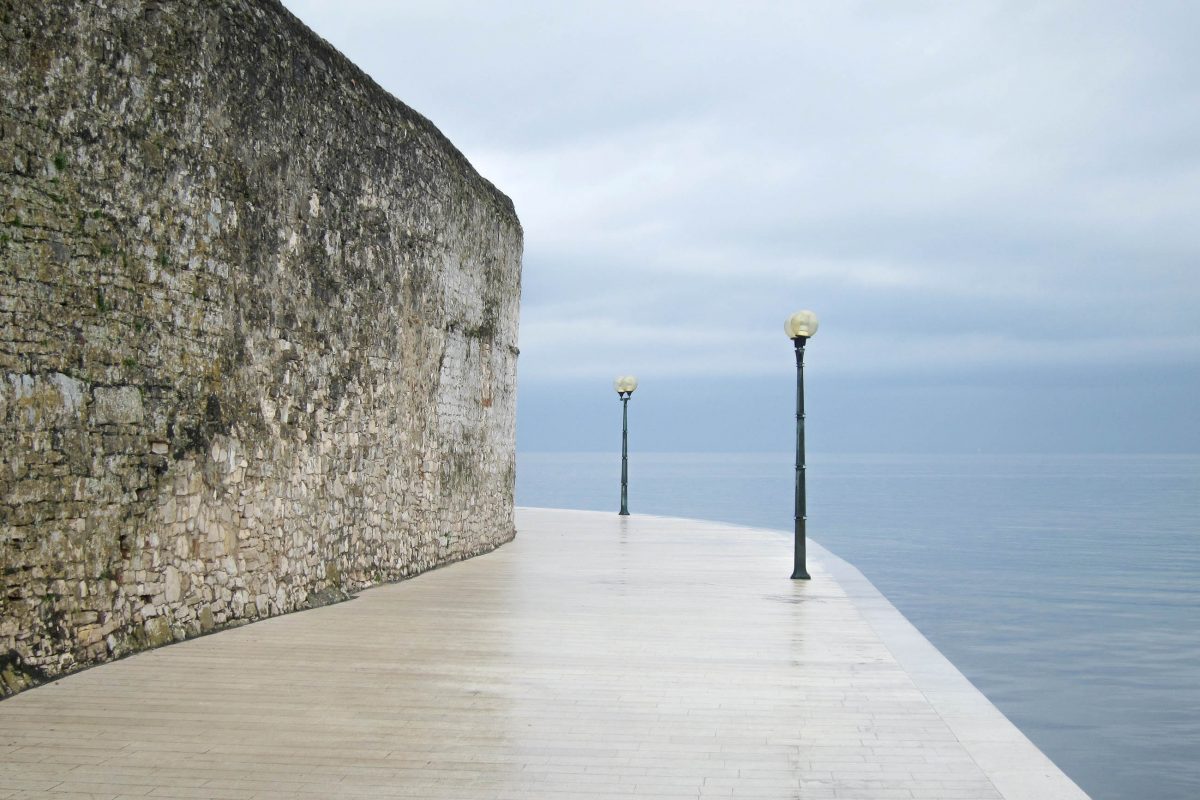
Die gesamte Altstadt liegt auf einer Halbinsel, deren Zugang der mächtige Peterokutna Kula (Fünfeckiger Turm) markiert. Der venezianische Torturm aus dem Jahr 1447, der heute ein Restaurant beherbergt, ist auch gleichzeitig der Eingang zum Decumanus und der älteste bis heute erhaltene Wehrturm.
Neben dem Peterokutna kula sind von den einst 11 Türmen der Stadtmauer noch zwei weitere erhalten. Der Obrambena Kula (Nördlicher Turm), an dem noch Reste der Stadtmauer zu sehen sind, stammt aus dem Jahr 1473. Der Serenissima Kula (Runder Turm) wurde ein Jahr später errichtet. Letzterer thront neben dem Volksplatz (Narodni trg) und lockt Besucher heute mit einem Café mit Meerblick auf seine Terrasse.
Slobode trg und Kirche Gospa od Andela
Der Freiheitsplatz markiert den Eingang zur Altstadt und kann auch als Hauptplatz von Poreč bezeichnet werden. Mit zahlreichen Cafés und netten Restaurants ist er beliebter Treffpunkt und Veranstaltungsort.
Im Osten thront die barocke Kirche Gospa od Andela. Die Kirche der Madonna der Engel wurde 1770 auf den Fundamenten einer romanischen Kirche erbaut. Im Westen des Hauptplatzes startet mit dem Decumanus die schönste Straße in der Altstadt von Poreč.
Bauten am Decumanus

Hinter dem Peterokutna kula erstreckt sich der Decumanus, die 2000 Jahre alte Hauptstraße von Poreč. Die angrenzenden Bauten dieser Einkaufs- und Flaniermeile zeugen noch heute von der tausendjährigen venezianischen Herrschaft.
Spaziert ihr am Decumanus entlang gibt es mehrere interessante Bauten zu entdecken:
- Die beiden spätgotischen Adelshäuser Palazzo Polesini und Palais Sinčič mit dem städtischen Museum
- Das Haus der zwei Heiligen mit zwei Reliefs an seiner Fassade in der Seitenstraße Svetog Eleuterija
- Den Zuccato Palast, der heute eine Kunstgalerie beherbergt
- Das Romanische Haus aus dem 13. Jahrhundert
- Den gotischen Gebäudekomplex
- Das Kanonikerhaus aus dem Jahr 1257
Römisches Forum (Marafor trg)
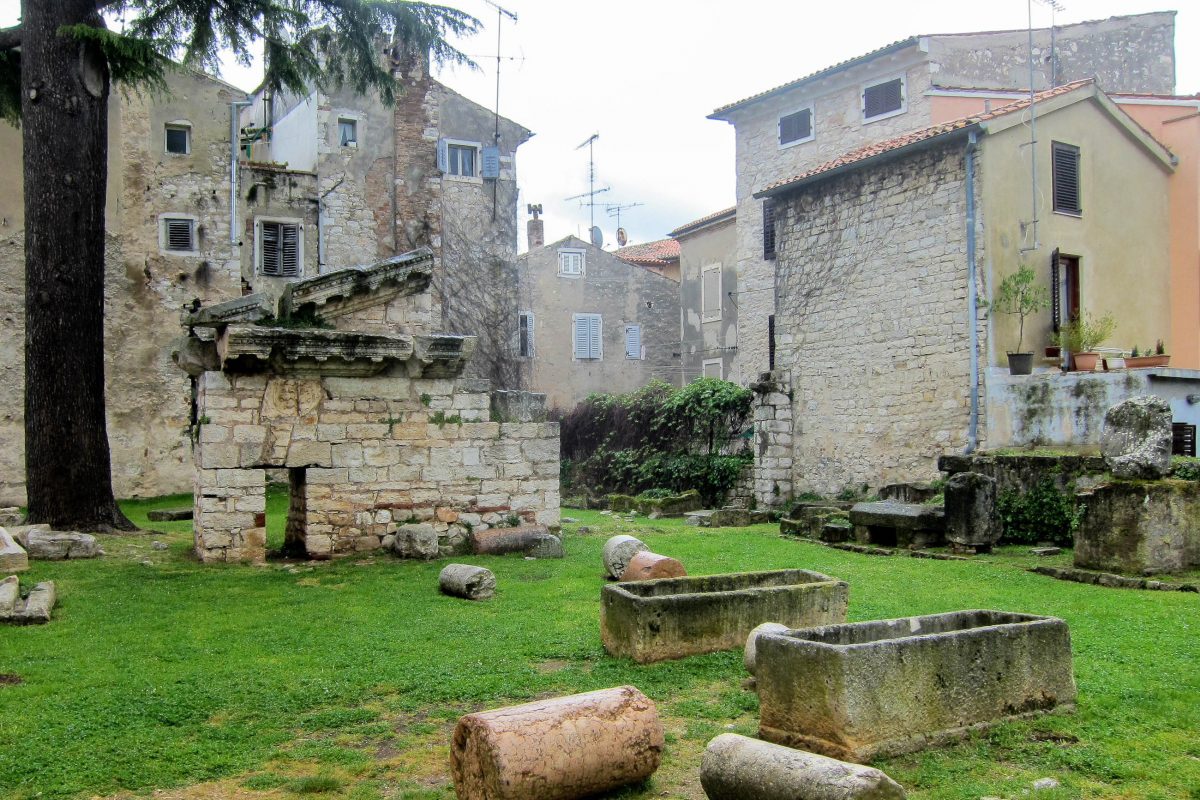
Am Ende des Decumanus liegt mit dem Marafor trg das Römische Forum. Der einstige Marktplatz weist heute noch ein paar Überreste der antiken Tempel und Pflastersteine auf. Zu den bemerkenswertesten zählen der Marstempel (einst einer der größten Tempel Istriens) und der Neptuntempel, die beide aus dem 1. Jahrhundert stammen.
Hafenstraße und Theater
Wendet man sich vom Decumanus nach rechts, erreicht man die Hafenstraße, die zur berühmten Euphrasius-Basilika führt. Hier ebenfalls sehenswert ist das Theater aus dem Jahr 1886, welches durch eine Skulptur auf dem Dach und seine beiden Reliefs des Poreč-Wappens an der Fassade ins Auge fällt.
Rathaus von Poreč
Gleich neben dem Theater liegt das mit hübschen Arkaden und Rundbogenfenstern geschmückte Rathaus von Poreč, welches 1909 von Architekten aus Triest erbaut wurde. Wendet man sich am Marafor trg nach rechts, gelangt man in die Eufrazijeva, die direkt zur bedeutendsten Sehenswürdigkeit der Altstadt von Poreč führt – der Euphrasius-Basilika.
Euphrasius-Basilika
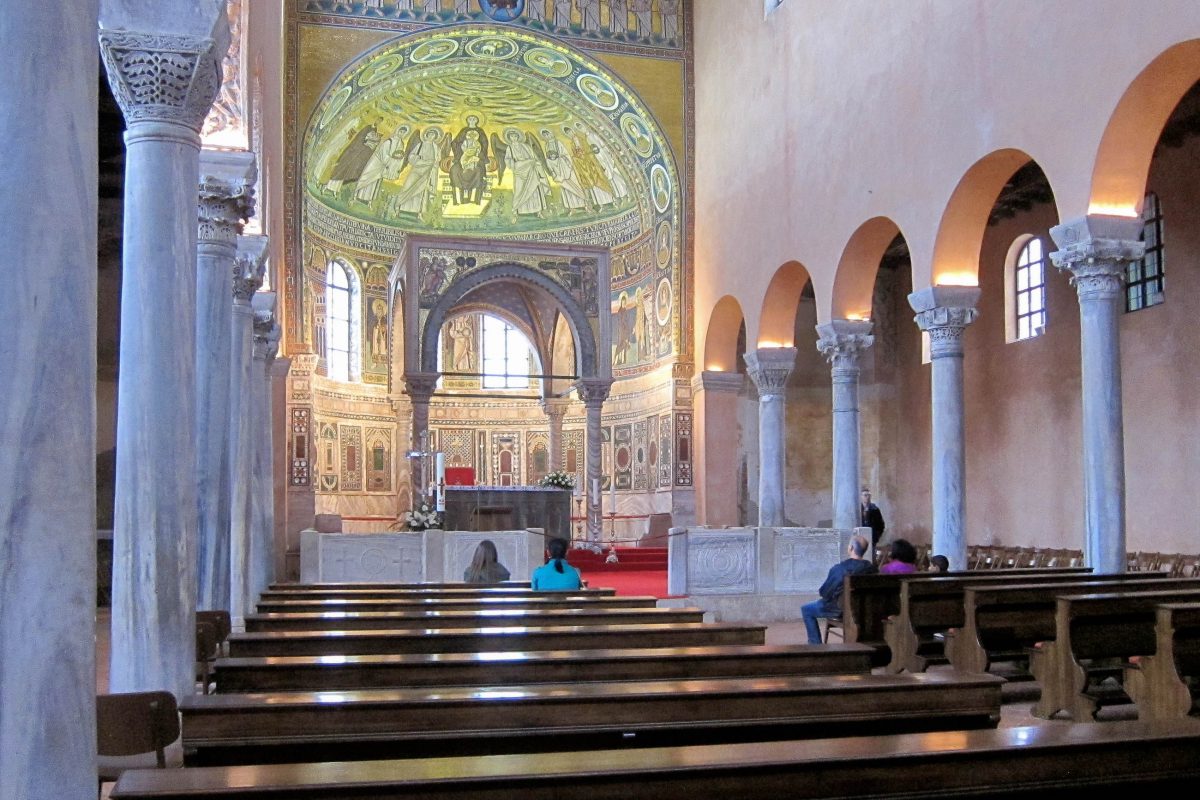
Die Euphrasius-Basilika ist das wertvollste Kulturdenkmal in ganz Istrien. Mit ihren kunstvollen Stuckverzierungen und Mosaiken an Wänden und Böden zählt sie zu den bedeutendsten Sakralbauten Kroatiens. 1997 wurde sie als wichtiges Beispiel für spätantike Kunst an der Adria zum Weltkulturerbe der UNESCO erklärt.
BILDER: Euphrasius-Basilika in Poreč
Fotogalerie: Euphrasius-Basilika in Poreč
Entstehung der Euphrasius-Basilika
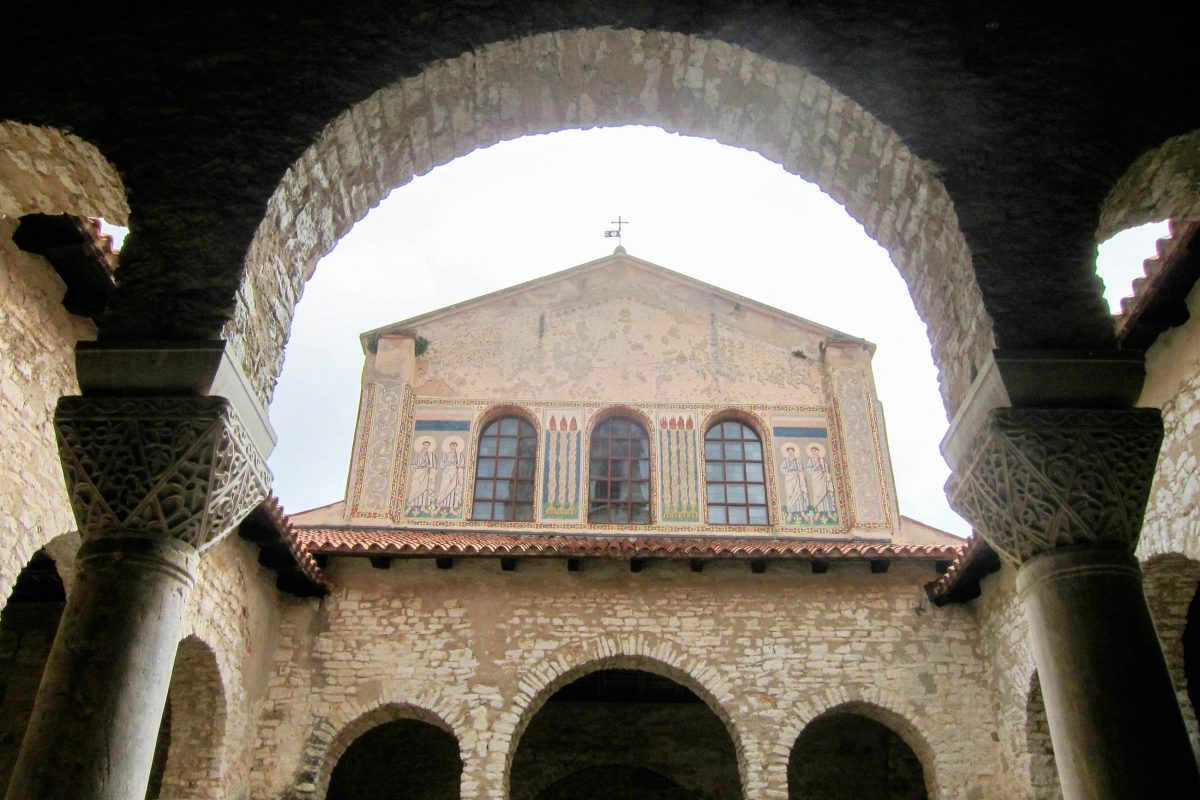
Der Bau der Euphrasius-Basilika im Norden der Altstadt erfolgte unter Bischof Euphrasius. Zuvor befand sich an ihrer Stelle das Haus des Heiligen Maurus, des ersten Bischofs von Poreč, der unter Kaiser Valerian zum Märtyrer wurde.
Im 4. Jahrhundert wurde das Haus zu einem zweischiffigen Oratorium und schließlich zu einer Kirche ausgebaut. Diese war jedoch bald so baufällig, dass sie komplett abgerissen und von 543 bis 554 neu errichtet wurde.
Teile der alten Kirche und des Oratoriums, wie zum Beispiel einige Bodenmosaike, wurden in den Neubau mit einbezogen. An den Bischof erinnern heute noch eine Inschrift und ein Bildnis auf den Mosaiken der großen Apsis.
Sehenswertes in der Euphrasius-Basilika

Die Basilika von Poreč beeindruckt vor allem durch ihre kunstvollen Mosaike und aufwendig gearbeiteten Säulenkapitelle, aber auch durch ihre wertvolle Ausstattung aus Marmor, Stein und Perlmutt. Lange glaubte man aufgrund des unglaublich guten Zustandes der Mosaike, dass sie erst im 13. Jahrhundert geschaffen wurden. Das erste Mosaik, ein Abbild von Jesus Christus auf goldenem Grund, kann gleich über dem Eingangsportal bewundert werden.
Die prächtigen Mosaike an den Wänden und auf dem Boden der Basilika verdienen genauere Betrachtung. Mit viel Liebe zum Detail sind hier Christus, die 12 Apostel, die Jungfrau Maria, verschiedene Heilige, Engel und andere christliche Symbole und Inschriften in verschiedensten Szenen dargestellt.
Mosaike aus dem 4. Jahrhundert
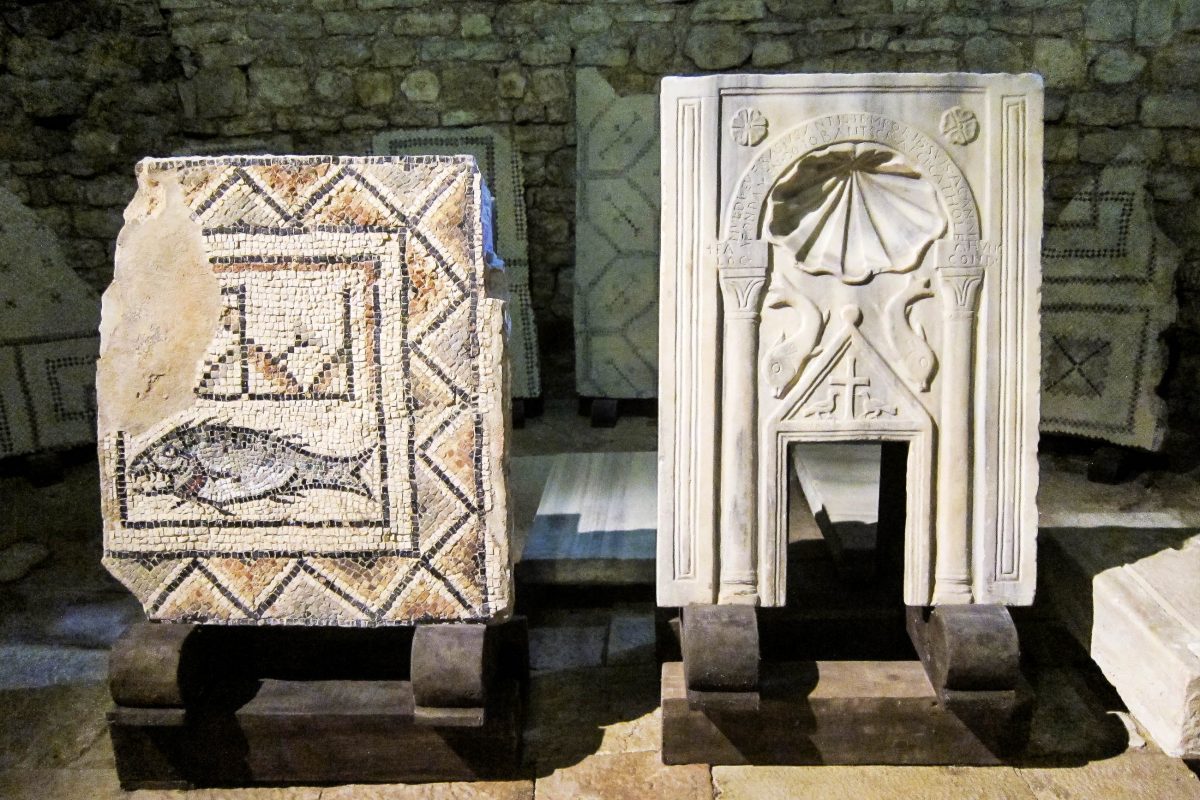
Einige der Bodenmosaike mit dem christlichen Symbol des Fisches stammen sogar noch aus dem 4. Jahrhundert, als die Basilika noch ein Oratorium war und sind bis heute erstaunlich gut erhalten.
Zusätzlich zu den Mosaikbildern ist das Interieur der Euphrasius-Basilika mit kunstvollen Stuckarbeiten und Inkrustationen aus Stein und Perlmutt geschmückt. Im Zentrum thront unter einem von Marmorsäulen gestützten Baldachin der mit Silber verkleidete Hauptaltar aus dem Jahr 1452.
Rund um die Basilika
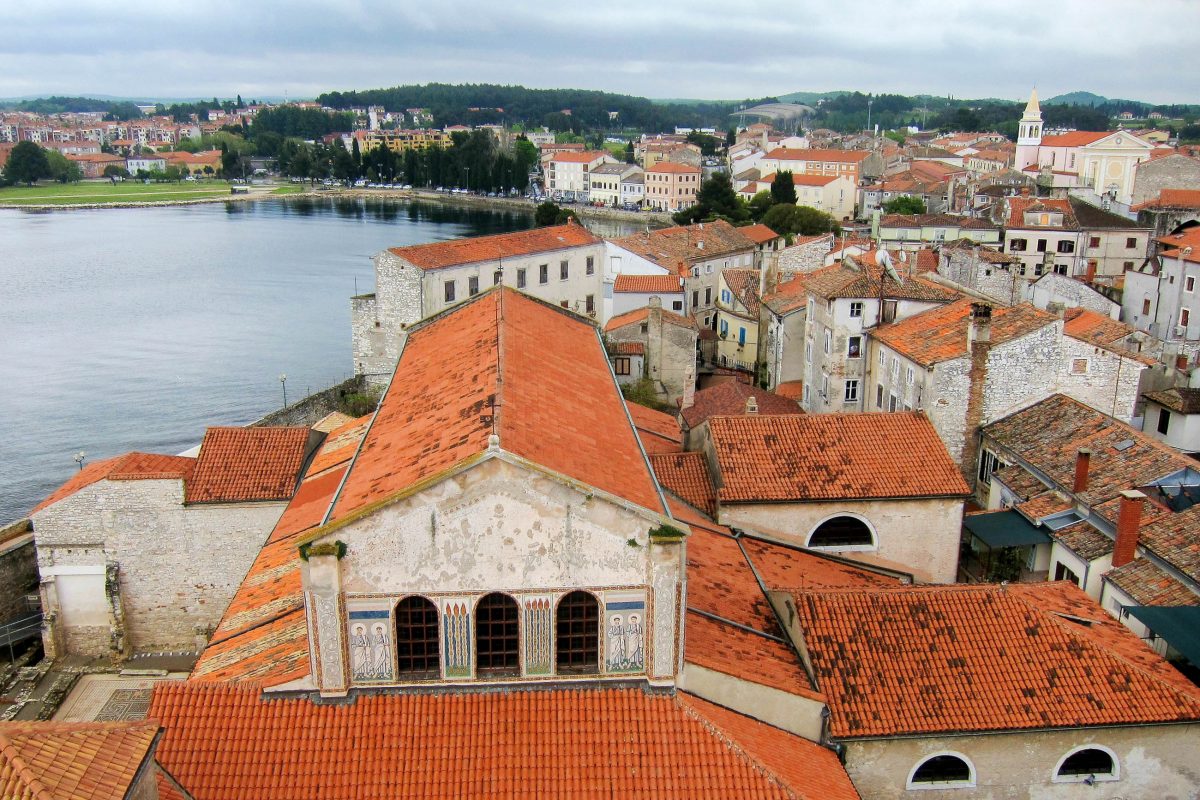
Der Glockenturm der Euphrasius-Basilika stammt aus dem 16. Jahrhundert. Der Turm kann bestiegen werden und bietet einen herrlichen Rundblick über die Altstadt.
Diözesanmuseum im Bischofspalast
Gleich neben der Euphrasius-Basilika thront der Bischofspalast von Poreč. Er stammt aus dem 13. Jahrhundert und geht ebenfalls auf die Ära von Bischof Euphrasius zurück. Damals war er durch einen Gang direkt mit der Basilika verbunden, heute beherbergt er das Diözesanmuseum. Ein Besuch des Museums lohnt sich nicht nur wegen der wertvollen Kirchenschätze, Skulpturen und Gemälde, sondern auch aufgrund der beeindruckenden Empfangshalle.
Liebfrauenkirche
Ein weiteres sakrales Highlight in Poreč ist die neoklassische Liebfrauenkirche, die zwischen 1743 und 1770 erbaut wurde, und an einem schmucken Hauptplatz ganz im Westen der historischen Altstadt liegt.
Street Art Festival
Jedes Jahr im August beleben beim Street Art Festival von Pula junge Künstler die Straßen und Plätze der Altstadt mit einer faszinierenden Symbiose zwischen Antike und Moderne.
BILDER: Altstadt von Poreč
Fotogalerie: Altstadt von Poreč
Ausflugstipps von Poreč
Wasserpark Aquacolors
Ihr wollte Baden in Kroatien aber zur Abwechslung mal nicht am Strand? Vor allem Familien mit Kindern wird dieser Ausflug Freude bereiten. Der pitschnasse Vergnügungspark liegt knapp 10 Autominuten südlich von Poreč und zählt mit Wasserrutschen, Wellenpools und mehr zu den größten Wasser-Vergnügungsparks in Südosteuropa.
Grotte Baredine
Wenn ihr vom Kultur- und Strandurlaub in Kroatien eine Pause braucht, bietet sich eine Besichtigung der Baredine-Höhle an. Die weithin bekannte Tropfsteinhöhle liegt bei Nova Vas rund 15 Autominuten nordöstlich von Poreč. Die von Grottenolmen bevölkerten Höhlen könnt ihr auch abseits der befestigten Pfade auf abenteuerlichen Klettertouren erforschen.
Weiterführende Links:
Offizielle Website von Poreč
Offizielle Website des Wasserparks Aquacolors
Offizielle Website der Grotte Baredine




